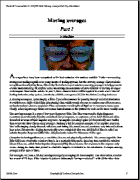V.6:6 (220-223): Moving averages Part 1 by John Ehlers
Product Description
Moving averages
Part 1
by John Ehlers
Averages have long been recognized as the best estimator of a random variable. Traders use moving averages as trading signals or as components of trading systems, but the moving average characteristics are seldom described for them. This is the first of a two-part article on moving averages to help promote a wider understanding. I'll explore some interesting characteristics of several kinds of moving averages and compare them in this article. In part 2, these characteristics will be applied to create a new kind of leading indicator entry system. I modestly call this new system ELI for the Ehlers Leading Indicator.
A moving average is, quite simply, a filter. It provides a means for passing through certain information we wish to see, while witholding (attenuating) data which would obscure or confuse our efforts to see a particular pattern. Just as sunglasses filter out certain wavelengths of light so we can see a scene more clearly, a moving average filters out certain data elements so the pattern we seek can be more readily seen. The moving average is a type of low-pass frequency filter. The filter removes the high-frequency variations to produce the familiar smoothed line or response, as engineers call it. Such filters are often described in terms of their impulse response. An impulse is a sharp spike (of theoretically zero width) that excites the filter (the moving average). Striking a bell is a simple example of an impulse response.
The bell's ringing slowly dies out with time and during this period several overtones may interact to form beat notes. Because the ringing theoretically never completely dies out, this kind of filter is called an Infinite Impulse Response (IIR) filter. All physically realizable filters are of this type.
Averages have long been recognized as the best estimator of a random variable. Traders use moving averages as trading signals or as components of trading systems, but the moving average characteristics are seldom described for them. This is the first of a two-part article on moving averages to help promote a wider understanding. I'll explore some interesting characteristics of several kinds of moving averages and compare them in this article. In part 2, these characteristics will be applied to create a new kind of leading indicator entry system. I modestly call this new system ELI for the Ehlers Leading Indicator.
A moving average is, quite simply, a filter. It provides a means for passing through certain information we wish to see, while witholding (attenuating) data which would obscure or confuse our efforts to see a particular pattern. Just as sunglasses filter out certain wavelengths of light so we can see a scene more clearly, a moving average filters out certain data elements so the pattern we seek can be more readily seen. The moving average is a type of low-pass frequency filter. The filter removes the high-frequency variations to produce the familiar smoothed line or response, as engineers call it. Such filters are often described in terms of their impulse response. An impulse is a sharp spike (of theoretically zero width) that excites the filter (the moving average). Striking a bell is a simple example of an impulse response.
The bell's ringing slowly dies out with time and during this period several overtones may interact to form beat notes. Because the ringing theoretically never completely dies out, this kind of filter is called an Infinite Impulse Response (IIR) filter. All physically realizable filters are of this type.
FOR THOSE ORDERING ARTICLES SEPARATELY:
*Note: $2.95-$5.95 Articles are in PDF format only. No hard copy of the article(s) will be delivered. During checkout, click the "Download Now" button to immediately receive your article(s) purchase. STOCKS & COMMODITIES magazine is delivered via mail. After paying for your subscription at store.traders.com users can view the S&C Digital Edition in the subscriber's section on Traders.com.
| Take Control of Your Trading. |
| Professional Traders' Starter Kit |
| All these items shown below only $430! |
| Click Here to Order |



